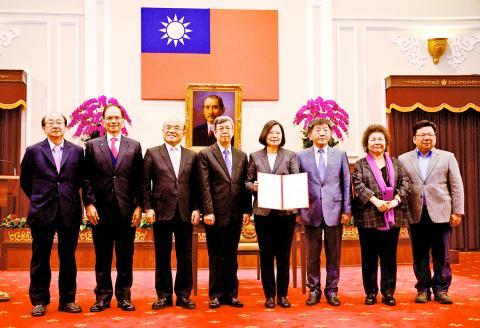
Lawmakers passed the Special Act on COVID-19 Prevention, Relief and Restoration yesterday, providing for a NT$60 billion (US$1.97 billion) special budget to help businesses and workers, and it was immediately sent to the Presidential Office, where President Tsai Ing-wen signed it into law.
The 19-article act stipulates penalties and fines for breaking quarantine, hoarding essential materials, compensation for furloughed workers and tax breaks for companies and organizations affected by the viral outbreak and those that pay employees under quarantine or on leave to care for quarantined family members.
The act is retroactive to Jan. 15 and is to be valid until June 30 next year, except articles 12 through 16, which took effect after the act was ratified yesterday.
People who are furloughed as a result of being placed under quarantine — at home or government-designated buildings — as well as people who need to take leave to take care of quarantined family members, but are not paid by their employers, have up to two years to request compensation from health authorities.
Employers — including government agencies and institutions, legal institutions, schools, companies and civic groups — should grant disease prevention leave to quarantined workers, and must not count them — or employees on leave to care for quarantined relatives — as absent without leave, force them to file for leave for any other reason, cancel their attendance bonus or deduct days off they have earned.
Employers who break this rule can be fined between NT$50,000 and NT$1 million.
Employers who pay these employees their salaries would receive income tax deductions of up to twice the salary payout, with the application process to be defined by the Ministry of Health and Welfare (MOHW) and the Ministry of Finance, the act states.
People who break quarantine at government-designated sites would be subject to a fine of between NT$200,000 and NT$1 million, whereas those who break home quarantine would be fined between NT$100,000 and NT$1 million.
Among other measures, the Central Epidemic Command Center (CECC) can film or photograph people who breach quarantine or people confirmed to have COVID-19, publish their personal information, or take any other measures necessary to contain the spread of the virus, the act states.
People who spread rumors or disinformation about COVID-19 to the extent that it harms the public interest would face a maximum prison term of three years and a possible fine up to NT$3 million.
Governments at all levels have the authority to expropriate privately owned land, buildings, medicine, equipment, transport, waste processing facilities on the order of the CECC, and people who refuse to comply with such expropriations would face a fine of between NT$50,000 and NT$1 million.
People who hoard or attempt to hoard equipment or medicines deemed necessary for disease prevention, as published by the health ministry, would face a prison term of up to five years and a possible fine of up to NT$5 million.
Medical workers and disease-prevention effort personnel are to receive subsidies and are to be given extra compensation should they fall ill or die as a result of their work, including, in cases of fatalities, health ministry subsidises for their children’s education.
he act is to be funded by a special budget of no more than NT$60 billion allocated from surplus revenue from prior fiscal years or loans.
The Executive Yuan is to deliver a written report to the Legislative Yuan on the use of the special budget and the COVID-19 situation three months after the act is ratified, while the premier is to give an oral report at the legislature six months after its ratification.
More details on how to carry out the relief measures stipulated by the new law are to be drafted and presented to the Cabinet.